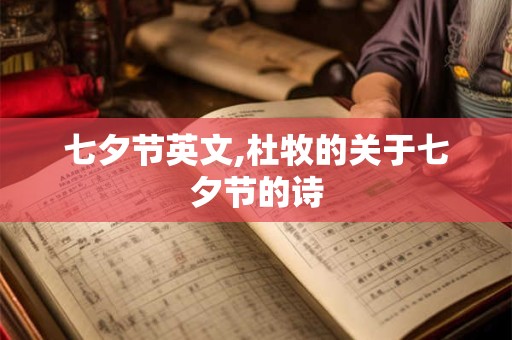As the evening sky blurs the boundary between day and night, the annual celebration of love, known as Qixi Festival, or the Chinese Valentine's Day, gracefully unfolds its charm. On this enchanting night, the tale of celestial lovers, cowherd and weaver, is commemorated. One of the most famous poems about this festival is "Qixi" by Du Mu, a唐代 poet whose verses capture the essence of this romantic event.
The Festival's Origin
The Qixi Festival, falling on the seventh day of the seventh lunar month, is steeped in Chinese folklore and mythology. It originates from the tale of 牛郎 (Niulang), the cowherd, and 织女 (Zhi Nu), the weaver girl. According to legend, their love was so profound that the universe itself had to intervene, allowing them to meet only once a year on this night when the stars align.
Du Mu's Poetic Insight
Du Mu's poem, "Qixi," offers a poignant glimpse into the emotions and rituals associated with the festival. The poem begins with a vivid depiction of the night sky:
>"The silver river in the sky/Is difficult to cross/Even if it is not far apart/They can only meet once a year."
Du Mu's words evoke the sense of longing and the challenges faced by the celestial lovers.
The Celestial Lovers
The legend of Niulang and Zhi Nu is a beautiful representation of love and perseverance. Niulang, a poor cowherd, falls in love with Zhi Nu, a fairy who comes to earth to weave. Their love story is marked by hardship, as they are torn apart by celestial forces. However, their love prevails, and they are allowed to meet once a year on the Qixi Festival.
Rituals and Traditions
strong>Prayer for Skills
On this night, young girls traditionally perform a ritual to pray for wisdom and skills, especially in weaving and embroidery. They offer fruits and flowers to Zhi Nu, hoping to inherit her weaving skills and beauty.
strong>Star Gazing
Another popular tradition is star gazing. People gather to look at the stars, especially the Vega and Altair constellations, which represent Zhi Nu and Niulang. It is believed that if you look closely, you can see the stars twinkling more brightly on this special night.
strong>Love Letters
In some regions, lovers exchange love letters or tokens of affection on the Qixi Festival. This tradition symbolizes the enduring love between the celestial couple and the hope for a similar love in their own lives.
Cultural Significance

The Qixi Festival holds great cultural significance in China. It is not just a celebration of love but also a reflection of traditional Chinese values such as loyalty, perseverance, and the importance of family. The festival serves as a reminder of the beauty of love and the strength it holds in the face of adversity.
Modern Celebrations
In modern times, the Qixi Festival has evolved to include various activities that cater to contemporary tastes. Young couples often plan romantic dates, and the festival has become a popular time for proposals and weddings. Social media is also filled with posts and wishes for love, making the festival a blend of tradition and modernity.
Conclusion
Du Mu's poem, "Qixi," continues to resonate with people today, offering a timeless reflection on love and the celestial tale that inspired the Qixi Festival. As the evening sky darkens and the stars begin to twinkle, the festival serves as a reminder of the enduring power of love, both on earth and in the heavens. The Qixi Festival is a beautiful celebration of love, hope, and the enduring human spirit.
